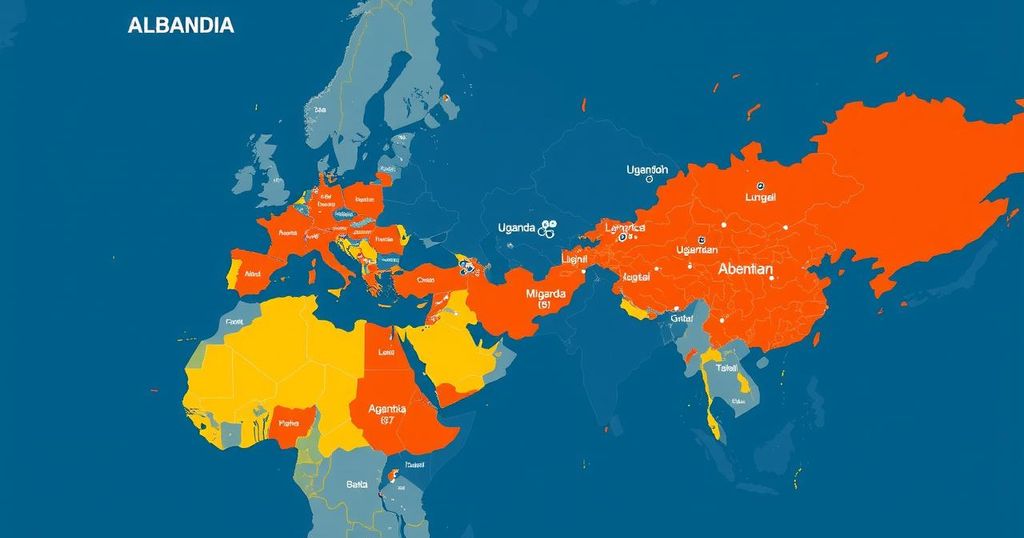The European Union is exploring options to house unwanted migrants through innovative strategies such as “return hubs” in countries like Uganda, while addressing the growing challenge of managing asylum seekers against a backdrop of rising far-right political influence. Key member states, including Poland, Italy, and Germany, are considering various strategies and agreements to handle this issue, underscoring the complexities and legal implications surrounding migrant deportation and asylum rights within the EU.
The European Union (EU) is actively seeking countries willing to accommodate unwanted migrants as it confronts a mounting challenge relating to asylum seekers. Following discussions among top EU leaders, the bloc is considering innovative strategies, including the establishment of “return hubs,” akin to a prior proposal by the United Kingdom to relocate failed asylum applicants to Rwanda. The EU aims to explore the relocation of those granted asylum to third countries deemed safe. Poland’s Prime Minister, Donald Tusk, received implicit support from EU officials for his initiative to suspend asylum rights amidst a surge in border crossings from Belarus. European Commission President Ursula von der Leyen emphasized that member nations should have the ability to implement reasonable temporary measures to manage the influx of migrants. This shift in policy corresponds with the increasing influence of anti-immigration sentiments across Europe, evidenced by recent electoral victories for far-right parties in Austria, Germany, and the Netherlands. However, skepticism remains regarding the practicality of such measures, especially regarding legal complexities that prohibit the exposure of individuals to conflict or abuse. Presently, no specific country has been designated to receive these migrants, although the Dutch government has suggested Uganda as a potential option. Italy is advancing a plan to direct refugees back to Syria, while Germany is negotiating with Uzbekistan to assume the responsibility for deported refugees in exchange for favorable migrant worker regulations. Although there is a willingness among some countries to reconsider their roles in handling asylum claims, legislative hurdles remain. The EU’s conclusion from recent summits advocates for determined actions across all levels to accelerate the deportation processes, currently reflecting an average where merely one in five rejected residency applications results in an actual deportation. Prime Minister Schoof of the Netherlands remarked, “These are innovative solutions that should in principle interest our colleagues here,” regarding the exploration of return hubs. Discussions implicate Uganda amid its existing commitment to shelter approximately 1.6 million refugees from neighboring regions. Despite its improving economic standing, Uganda’s human rights track record raises concerns, as highlighted by the World Bank withholding funding over such issues. Notably, past British attempts to send asylum seekers to Rwanda encountered substantial legal and operational challenges, leading to their eventual discontinuation under new UK leadership. As the EU seeks to establish offshore processing of asylum claims, Italy’s ongoing venture to manage migrants through facilities in Albania has faced initial challenges, with some individuals being sent back due to doubts about their eligibility. Austria’s ongoing push to revisit its Syrian strategy further underscores the complexity of the current migration landscape. Germany’s initiative to remove Afghan asylum seekers who, under new policies, visit the Taliban-run homeland exemplifies the evolving legal and ethical dilemmas surrounding migrant deportation. In conclusion, while the EU is contemplating various solutions to manage the influx of unwanted migrants, the collective commitment to maintaining asylum rights remains firm. The efficacy and humanitarian implications of these strategies, however, continue to be points of vigorous discussion and debate.
The European Union is grappling with the ongoing challenge posed by increasing numbers of asylum seekers. In an effort to navigate this complex issue, EU leaders are now considering controversial strategies, which include the establishment of “return hubs” for individuals from Africa and other regions deemed unsuitable for asylum status. The backdrop of rising anti-immigration sentiment across various member states has significantly influenced these new proposals, particularly as several countries have recently experienced electoral successes by far-right political factions. The necessity for a cohesive approach to manage asylum claims while adhering to international law and human rights standards presents a daunting task for EU policymakers. Several countries, including the Netherlands, Italy, and Germany, are exploring bilateral agreements with potential host nations to facilitate the relocation and management of migrants, highlighting the urgent and multifaceted nature of the migration crisis within the EU.
In summary, the European Union is at a critical juncture regarding its approach to managing unwanted migrants and asylum seekers. The strategies being considered, such as return hubs and offshore processing in countries like Albania and Uganda, reflect a growing inclination towards stricter immigration policies amidst rising anti-immigrant sentiments across the continent. While these measures aim to address pressing migration challenges, they invoke significant legal and ethical implications that warrant thorough examination. Moving forward, the balance between maintaining asylum rights and implementing effective border management strategies will remain a contentious and complex issue for EU leaders to navigate.
Original Source: www.thenationalnews.com







